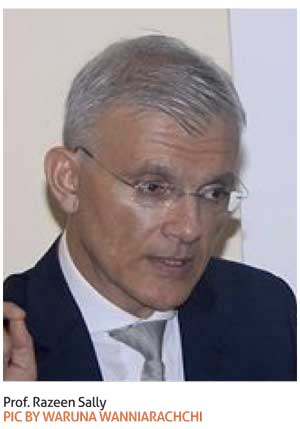22 Feb 2018 - {{hitsCtrl.values.hits}}
By Chandeepa Wettasinghe
The Sri Lankan government is ready to implement a short-term reform process, which will generate short-term gains and help the government increase its acceptance among the voters in the run up to the 2020 elections, according to a senior government economic advisor.
“Some of the short-term reforms, such as cutting through red tape and liberalizing the equity ownership of foreigners could be implemented in the next few weeks instead of waiting for the budget and would generate results in the short term,” state-run Institute of Policy Studies Chairman Professor Razeen Sally said.

Speaking at a UNP Young Professionals’ Organisation seminar in Colombo, he added that Sri Lanka needs to appeal to the foreign investors’ optimistic spirit, which has a snowballing effect on attracting further investment in the current environment, where the cost of finance is too high for debt-driven growth.
He said that this action plan was decided at a recent retreat held in Kalutara for key economic policymakers and advisors, where they agreed to prioritize on the immediate requirements for the economy.
Under the action plan, Finance Minister Mangala Samaraweera is expected to start a vastly different budget process, where he would set out the budget in the middle of the year and then only entertain the pet projects of ministers based on a cost-benefit analysis, instead of trying to fit in all such projects, as was done in the past.
However, the retreat had taken place before the humiliation the government suffered at the local government polls, a drubbing which Prof. Sally said the government deserved for the high handed, nonsensical and dangerous actions and policies of former Finance Minister Ravi Karunanayake and former Central Bank Governor Arjuna Mahendran.
Prof. Sally said with the economic policies implemented by this duo, Sri Lanka has squandered its reform opportunity starting from January 2015.
“The window for takeoff is almost closed, if not already closed,” he said.
However, he said that economic policies have improved over the last year due to the able management of Finance Minister Mangala Samaraweera and Central Bank Governor Dr. Indrajit Coomaraswamy.
Although some of Samaraweera’s first budget proposals for 2018 were “full of nonsense”, the language of the government’s policy direction towards liberalization had had an immediate effect on foreign investor sentiment, as investors in his network had begun discussing the possibilities of investing in Sri Lanka, Prof. Sally said.
Further, the government should liberalize all para tariffs and reduce import tariffs to 0-10 percent levels within the next three years, except for the most sensitive agriculture items, he recommended.
He said that if the government maintains the fiscal and monetary discipline with the aim of repaying the spiking debt payments and if the short-term reforms prescribed are followed, the government could stop a Mahinda Rajapaksa’s “Vladimir Putin-style illiberal democracy”—which sparks racial tensions and makes Sri Lanka a vassal of China—from rising to the top on the back of Rajapaksa’s momentum from the recent polls.
However, Prof. Sally said that the bureaucracy may be getting ready to welcome back Rajapaksa despotism and may drag its feet on the reforms.
Sri Lanka’s odds aren’t favourable, given its past performances on reforms, he said.
“I know where I’ll be betting,” he said.
He said that there is little chance for drifting in the political economic environment under a unity government due to the inherent differences between the two main parties and that the country would either take off under a short-term minority UNP government or relapse under Mahinda Rajapaksa.
19 Nov 2024 47 minute ago
19 Nov 2024 58 minute ago
19 Nov 2024 1 hours ago
19 Nov 2024 2 hours ago
19 Nov 2024 3 hours ago